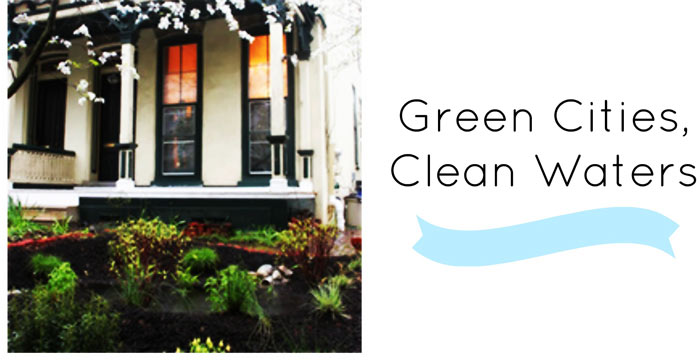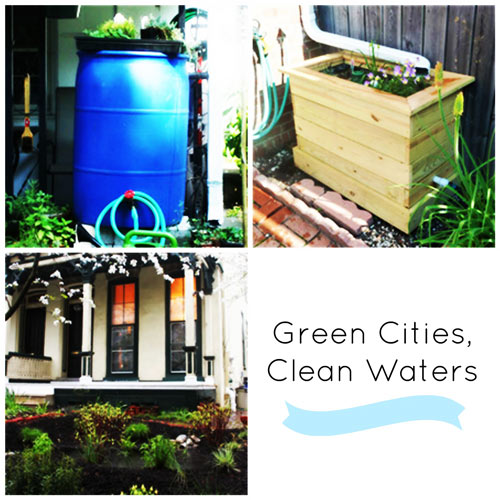
4 FREE* Rain Barrels & Stormwater Tools for Philadelphians
*Or very low cost. But you clicked, right?
Green City, Clean Waters, Philly’s 25-year plan for protecting its watersheds, uses green infrastructure for stormwater management. The project, recognized by the EPA for setting the standard for a national model for green infrastructure, catapulted Philly to the forefront for stormwater management.
Why is stormwater a concern?
Rain water from year-round storms picks up debris, chemicals, dirt, and other pollutants that flow into Philly’s storm sewer system and on occasion, waterways.
Anything that enters the storm sewer system flows, untreated, into the water we use for swimming, fishing and even drinking. Although the water is cleaned, it’s more cost efficient in the long run if we take care of it sooner.
How can you participate
Good news: The Philadelphia Water Department (PWD) offers Philly residents a variety of ways to help manage stormwater at their homes and neighborhoods. Various programs like Rain Checks, Green Home Projects and Clean Stormwater Tips are free to city participants or are partially funded by the PWD. Projects range from simple installations for rain collection to larger projects to renovate.
Let’s break down the most popular programs you can participate in:
1. Rain Check
Rain Check is a program that helps Philly residents assess their needs for stormwater management at their homes.
The Rain Check program, funded by PWD and managed by the Pennsylvania Horticultural Society (PHS), guides you to he best project for your home and arranges installation for rain barrels, porous pavement and more.
2. Rain Barrel Program
Rain Barrels are a great way to collect rain water for further uses such as gardening, lawn watering, etc. and decreases the impact of stormwater runoff into the city’s sewer systems.
The city hosts workshops that provide free rain barrels to Philly residents. Rain barrels are ideal for those who have limited space, want to minimize runoff AND cost or are looking for a way to collect water for landscaping purposes.
Rain Check participants attend a rain barrel workshop to learn how to install and use their new rain barrel. Rain Check’s rain barrels are blue, food-grade recycled plastic and hold 55 gallons of rain water.
3. Cost Share Projects:
A number of possible stormwater tools are subsidized by the PWD to help you get started. Sign up for Rain Check’s Cost-Share Program to assess which of the 4 following stormwater tools are best for you:
- Downspout Planter: Using rainfall from the roof as irrigation, decorative garden planters both decorate your outdoor space and help manage water run-off. Win-win. They store 18-32 gallons of water depending on their size, ranging from 1.5’x3’ to 2’x4’. Approximate Total Cost: $975, PWD Pays: $875, Resident Pays: $100*
- Rain Gardens – One of the simplest way to manage runoff, these gardens are planted lower than the surrounding area to cutoff stormwater from reaching the sewer. Plants in the garden are chosen based on their ability to handle both wet and dry weather, filter pollutants, and replenish groundwater. Approximate Total Cost: $17/sq. ft., PWD pays: $16/sq. ft. up to $2000, Resident Pays Remainder*
- De-pave Your Yard – The hard surfaces in your backyard allows rain water to wash off carrying dirt, oil, and other pollutants into the sewers. Re-designing and minimizing these hard paved surfaces helps create an easier way for water to filter through the soil. Don’t worry about looks: the removed paving can be replaced with grass seed, stone or other landscaping materials.
o Approximate Total Cost: $10/ sq. ft., PWD pays: $8/sq. ft. up to $2000, Resident Pays Remainder*
- Porous Pavement – Paved surfaces like asphalt and concrete prevent water drainage during storms, causing water to “sheet” and bring pollution into the city’s sewers and water ways. Porous Paving is a redesign of paved surfaces to allow water to filter through and into the ground.
o Approximate Total Cost: $30/sq. ft., PWD pays: $15/sq. ft. up to $2000, Resident Pays Remainder*
*These Estimates are effective 7/1/2014.
4. Green Home Projects:
Already taken part in the Rain Check program but want to do more? Or looking for more ways to cut back on runoff? Check out these home projects to spruce up your yard and help Philly’s waterways.
- Green Roofs – Absorbing and retaining up to 50% of rainfall they receive, green roofs are a way to reduce the amount of stormwater runoff hitting the city streets. The green roof spaces absorb rainfall and nourish a selection of plants and flowers.
- Trees – Another way to reduce runoff is to add more trees to your area, as roots absorb stormwater and their canopies can help slow the flow of rain. Plus, you’ll breathe easier with trees to reduce air pollutants.
- Wildflower Meadow – A mix of hardy native plants and grasses can filter stormwater, promote groundwater infiltration, while remaining an aesthetically pleasing, low-maintenance yard feature.
- Container Garden – If you don’t have much space to spare, setting up a collection of small container plants in your patio space can help in reducing the amount of runoff that would otherwise find its way into the storm sewers and waterways.
- Dry Well – Providing a temporary storage space for stormwater, dry wells allow runoff to gradually soak into the ground. The wells are small, excavated pits filled with gravel or stone that is permeable by water.
Clean Water Action
We chatted with local non profit Clean Water Action Program Organizer Michael Roles about Green Cities, Clean Waters. He’s optimistic about the program, but acknowledges many variables that could disrupt progress of the program’s goals (new Administrations, etc.). They’ll continue to monitor the implementation while engaging communities to take ownership of green programs. As Roles stated,
“Why wouldn’t someone get excited about Green City Clean Waters? When it pours, everything we’re draining (well, those located in a combined sewer area) in our tubs, sinks, and down toilets is getting dumped – raw and untreated – straight into our rivers, our drinking water sources. Green City Clean Waters presents us with a creative opportunity to solve that by coming together as a community, getting engaged with our city, and seeing through solutions that will save money, raise property values, make our neighborhoods more livable; improving our quality of life in Philadelphia.”
Readers, have you participated in any of the Green Cities, Clean Waters programs? Tell us in the comments.









